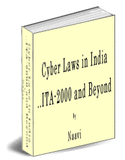Privacy Intrusion has got a new meaning with the emergence of the Mobile
Phones with Cameras. Now taking pictures on the fly and sending it across the
globe through an e-mail has become easy. Use of mobile phones in public
places is already a common habit. However, taking pictures of strangers or
even of friends without permission is increasingly is a growing menace which
needs to be addressed before it starts damaging the social fabric.
It is already common to see women being harassed by posting of false obscene
messages on pornographic sites and message groups. It is also not common to
see celebrity faces being attached to other obscene photographs and
distributed on the net. With such digital manipulative possibilities,
presence of digital camera embedded mobile phones which can take the picture
of any person in the public is a serious hazard.
Also, the irresponsible advertising of Camera phones is being undertaken
by the Advertisers, is effectively promoting privacy intrusion as an
acceptable life style of the young generation. If Privacy intrusion is an
offence under the Indian Constitution any advertising to promote such a habit
is illegal and punishable.
Unfortunately, Indian laws on privacy are not well defined. Though Privacy
right is derivable from the constitution and also brought under IPC under
section 509, the law that provides a strong deterrent to the offender with a
financial compensation to the victim is not available.
Under Section 509, any act of invasion of privacy of a woman (Corresponding
protection of men is not available) is punishable with an imprisonment of upto
1 year. However the criminal prosecution can put an offender in jail but not
provide any sustainable compensation to the victim. If because of a false
digital picture of a woman being circulated she loses a job or remains un
married, the jail sentence to the victim is of no relevance to the offended
lady. On the other hand, if she could have obtained a financial
compensation, it would have helped the lady to sustain herself economically.
If a civil liability suit is to be pursued for compensation, it would be
extremely difficult for an honest Citizen to get the redressal within an
acceptable time frame.
More over for the type of crimes such as a privacy intrusion using Camera
phone committed by a young prank, imprisonment may not be the right type of
punishment. Instead of reforming the person, it may turn him into a hostile
citizen and also encourage him to bribe his way out of the judicial
proceedings and contribute to the increase of corruption in judiciary.
It is therefore necessary to provide an alternate remedy to the victims of
Privacy intrusion which provides adequate financial compensation to the
victim.
In this context what comes readily to mind is that since digital pictures
taken by Mobile phones are "Electronic Documents" as per ITA-2000, and
ITA-2000 has civil compensation possibility upto Rs 1 crore and through a
simplified adjudication procedure, it appears natural to look at ITA-2000 for
a proper remedy.
Had the Communication Convergence Bill had been passed, this issue would have
been addressed to some extent. Now that the Convergence Bill has been
withdrawn, it is time for the Government to consider the possibility of
introducing an amendment to the ITA-2000 itself where by Section 43 can be
extended to include "Unauthorized capture of digital text, picture or audio
and/or using such text, picture or audio in such a manner as to cause
embarassment, defamation or financial loss to any person".
The need for such a law is even more relevant today since the digital
technology has opened a whole new dimension to taking pictures.
 While
we have so far discussed the mobile phones with camera as tools of privacy
invasion, it is necessary for us to also consider the dangers of digital
filters which can see through clothing (See Reference below).
While
we have so far discussed the mobile phones with camera as tools of privacy
invasion, it is necessary for us to also consider the dangers of digital
filters which can see through clothing (See Reference below).
 One
of the latest additions to the threat is from the "Digital Binoculars" that
can see and take pictures from a distance of 1 mile as the ad for the product
claims. (See reference indicated below).
One
of the latest additions to the threat is from the "Digital Binoculars" that
can see and take pictures from a distance of 1 mile as the ad for the product
claims. (See reference indicated below).
It is now possible therefore to not only take a picture of a woman on the
street without her permission and manipulate the picture digitally for fun,
revenge or blackmail, it is also possible to peep through clothes and intrude
from a distance to cause irreparable damage to members of the society.
While technology developments are welcome and have many beneficial aspects, it
is the responsibility of the society to use technology responsibly. Towards
this end some legal changes and procedural safeguards are required.
Apart from the legal provision mentioned above involving amendment of Section
43 of the iTA-2000. it should be made mandatory for Mobile Companies who act
as intermediaries in digital transmission of pictures that are the objects of
privacy invasion or obscenity under Section 67 of the ITA-2000 to introduce a
code of conduct for its users who avail the facility of e-mail transmission,
say in the form of signing of "Terms and Conditions" similar to one used by
say Yahoo mail service users which can be used to disable the e-mail
capability of a given instrument if required.
Secondly the advertisements that promote illegal activity of privacy intrusion
by projecting it as a common life style, should be banned and necessary
code of ethics has to be imposed. The existing provisions under the AAAI
should be sufficient for this purpose.
Publications such as Hindu which pride themselves of a "Advertisement Policy"
which does not allow shady advertisements being published should also check
their consciousness if the publication of ads of Camera Phones they are now
carrying meet the ethical standards they have set for themselves. If
publications and TV channels are aware of Cyber Laws and how they are
contributing to the illegal activity by carrying advertisements, they will
perhaps act as a natural filter for such activities even without any legal
provisions.
Naavi
March 07, 2004
Related Article in Hindu
Digital
Binocular
See Through Camera
